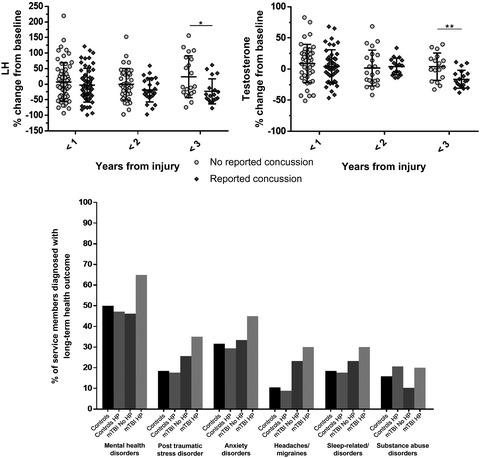当前位置:
X-MOL 学术
›
J. Neurosci. Res.
›
论文详情
Our official English website, www.x-mol.net, welcomes your
feedback! (Note: you will need to create a separate account there.)
Neuroendocrine function and associated mental health outcomes following mild traumatic brain injury in OEF-deployed service members.
Journal of Neuroscience Research ( IF 2.9 ) Pub Date : 2020-03-11 , DOI: 10.1002/jnr.24604 Stephanie L Ciarlone 1, 2 , Jonathan K Statz 1, 2 , Jessica A Goodrich 1, 2 , Jacob N Norris 3 , Carl W Goforth 1, 4 , Stephen T Ahlers 1 , Anna E Tschiffely 1
Journal of Neuroscience Research ( IF 2.9 ) Pub Date : 2020-03-11 , DOI: 10.1002/jnr.24604 Stephanie L Ciarlone 1, 2 , Jonathan K Statz 1, 2 , Jessica A Goodrich 1, 2 , Jacob N Norris 3 , Carl W Goforth 1, 4 , Stephen T Ahlers 1 , Anna E Tschiffely 1
Affiliation

|
Mild traumatic brain injury (mTBI) has been linked to mental health disorders (MHDs) and pituitary function alterations. Due to the complex relationship of mTBI, the neuroendocrine system, and MHDs, we propose that neuroendocrine dysfunction (NED) may play a role in negative long-term health outcomes. The goal of this study was to determine if blast-concussed service members (SMs) have a stronger likelihood of developing NED. We hypothesized that NED either pre- or post-injury is associated with poor mental and physical health outcomes. Serum samples from the Armed Forces Health Surveillance Branch were obtained from concussed (n = 59) and non-concussed (n = 72) SMs treated at the Concussion Restoration Care Center (CRCC) in Afghanistan. Serum was collected within 2 years prior to deployment and one or two times within 3 years following their CRCC visit. Samples were analyzed for luteinizing hormone (LH), testosterone, human growth hormone, cortisol, and prolactin to assess post-injury neuroendocrine function. Results indicate that SMs who incurred an mTBI exhibited long-term LH and testosterone deficiencies 3 years following injury compared to controls. Specifically, 47.6% of head-injured SMs displayed hypofunction in at least one of five hormones at 3 years post-injury. Anxiety disorders were the most common MHD observed in concussed SMs with hypopituitarism, while there was also a trend for SMs with chronic pituitary dysfunction to have MHD diagnoses. Findings indicate blast-related mTBI may be associated with long-term health outcomes following a period of incubation. Neuroendocrine screenings may increase treatment opportunities, inform rehabilitation strategies, and improve overall quality of life for patients.
中文翻译:

OEF 部署的服务人员轻度创伤性脑损伤后的神经内分泌功能和相关的心理健康结果。
轻度创伤性脑损伤 (mTBI) 与精神健康障碍 (MHD) 和垂体功能改变有关。由于 mTBI、神经内分泌系统和 MHD 之间的复杂关系,我们提出神经内分泌功能障碍 (NED) 可能在负面的长期健康结果中发挥作用。这项研究的目的是确定爆炸脑震荡的服役人员 (SM) 是否更有可能患上 NED。我们假设受伤前或受伤后的 NED 与不良的身心健康结果有关。来自武装部队健康监测处的血清样本来自在阿富汗脑震荡恢复护理中心 (CRCC) 接受治疗的脑震荡 (n = 59) 和非脑震荡 (n = 72) SM。在部署前 2 年内收集血清,并在他们访问 CRCC 后的 3 年内收集一到两次血清。分析样品中的促黄体激素 (LH)、睾酮、人类生长激素、皮质醇和催乳素,以评估损伤后的神经内分泌功能。结果表明,与对照组相比,发生 mTBI 的 SM 在受伤 3 年后表现出长期的 LH 和睾酮缺乏症。具体而言,47.6% 的头部受伤 SM 在受伤后 3 年内表现出五种激素中至少一种的功能减退。在患有垂体功能减退症的脑震荡 SM 中,焦虑症是最常见的 MHD,而患有慢性垂体功能障碍的 SM 也有被诊断为 MHD 的趋势。研究结果表明,爆炸相关的 mTBI 可能与潜伏期后的长期健康结果有关。
更新日期:2020-03-11
中文翻译:

OEF 部署的服务人员轻度创伤性脑损伤后的神经内分泌功能和相关的心理健康结果。
轻度创伤性脑损伤 (mTBI) 与精神健康障碍 (MHD) 和垂体功能改变有关。由于 mTBI、神经内分泌系统和 MHD 之间的复杂关系,我们提出神经内分泌功能障碍 (NED) 可能在负面的长期健康结果中发挥作用。这项研究的目的是确定爆炸脑震荡的服役人员 (SM) 是否更有可能患上 NED。我们假设受伤前或受伤后的 NED 与不良的身心健康结果有关。来自武装部队健康监测处的血清样本来自在阿富汗脑震荡恢复护理中心 (CRCC) 接受治疗的脑震荡 (n = 59) 和非脑震荡 (n = 72) SM。在部署前 2 年内收集血清,并在他们访问 CRCC 后的 3 年内收集一到两次血清。分析样品中的促黄体激素 (LH)、睾酮、人类生长激素、皮质醇和催乳素,以评估损伤后的神经内分泌功能。结果表明,与对照组相比,发生 mTBI 的 SM 在受伤 3 年后表现出长期的 LH 和睾酮缺乏症。具体而言,47.6% 的头部受伤 SM 在受伤后 3 年内表现出五种激素中至少一种的功能减退。在患有垂体功能减退症的脑震荡 SM 中,焦虑症是最常见的 MHD,而患有慢性垂体功能障碍的 SM 也有被诊断为 MHD 的趋势。研究结果表明,爆炸相关的 mTBI 可能与潜伏期后的长期健康结果有关。











































 京公网安备 11010802027423号
京公网安备 11010802027423号